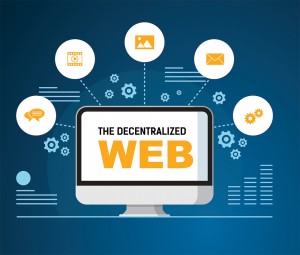The Decentralized Web

The Decentralized Web pictures the future world where services such as communication, currency, publishing, social networking, search, archiving and much more are provided not by centralized services owned by single organizations, but by technologies which are powered by the people.
The main idea of decentralization is that the operation of a service is not dimly trusted to any single omnipotent company. Instead of, responsibility for the service is shared by running across multiple merged servers, or possibly running across client side apps in an entirely “distributed” peer-to-peer model.
The rules that describe the decentralized service’s behaviour are designed to force participants to act fairly in order to participate in all, relying heavily on cryptographic techniques such as Merkle trees and digital signatures to allow participants to hold each other accountable.
There are major areas that the Decentralized Web victors: privacy, data portability, and security.
PRIVACY
Decentralization forces an improved focus on data privacy. Data is distributed across the network and end-to-end encryption technologies are critical for ensuring that only approved users can read and write. Accessing to the data is entirely controlled algorithmically by the network as opposed to more centralized networks where usually the owner of that network has full access to data, simplifying customer profiling, and ad targeting.
DATA PORTABILITY
Decentralization forces an improved focus on data privacy. Data is distributed across the network and end-to-end encryption technologies are critical for ensuring that only approved users can read and write. Accessing to the data is entirely controlled algorithmically by the network as opposed to more centralized networks where usually the owner of that network has full access to data, simplifying customer profiling, and ad targeting.
DATA PORTABILITY
In a decentralized environment, customers own their data and choose with whom they share the data. They hold the control of it when they leave a given service provider. For instance, if the user wants to move from General Motors to BMW today, why should not the users be able to take the driving records with them? The same applies to chat platform history or health records.
SECURITY
We are living in a world of increased security threats. In a centralized environment, the bigger the storage tower, the bigger the honeypot is to attract bad actors. Decentralized environments are safer by their common nature against being hacked, infiltrated, acquired, bankrupted or compromised as they have been built to exist under public scrutiny from the outset.
As the internet itself need a grand re-levelling, taking different unconnected local area networks and providing a new neutral common ground that linked them all, now we see the same form happening again as technology begins to provide a new neutral common ground for higher level services. And much like Web 2.0, the first wave of this Web 3.0 invasion has walked among us for several years already.
Git is successful as fully decentralized version control system – almost it is completely replacing centralised systems like Subversion. Bitcoin demonstrates how a currency can exist without any central authority, contrasting with a centralised incumbent such as PayPal.
StatusNet provides a decentralized alternative to Twitter. XMPP was built to deliver a decentralized alternative to the messaging silos of AOL Instant Messenger, ICQ, MSN, and much more.
It is hard to forecast to which final direction Web 3.0 will take us. By unlocking the web from the hands of a few players this will unavoidably enables a surge in innovation and lets services to prioritise the user’s interests.
As the Decentralized Web attracts the interest and desire of the mainstream developer community, we cannot predict what new economies will arise and what kinds of new technologies and services they will invent.

